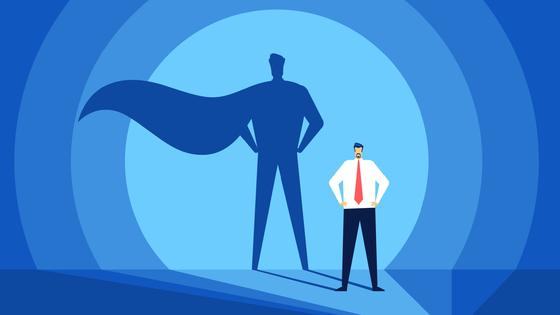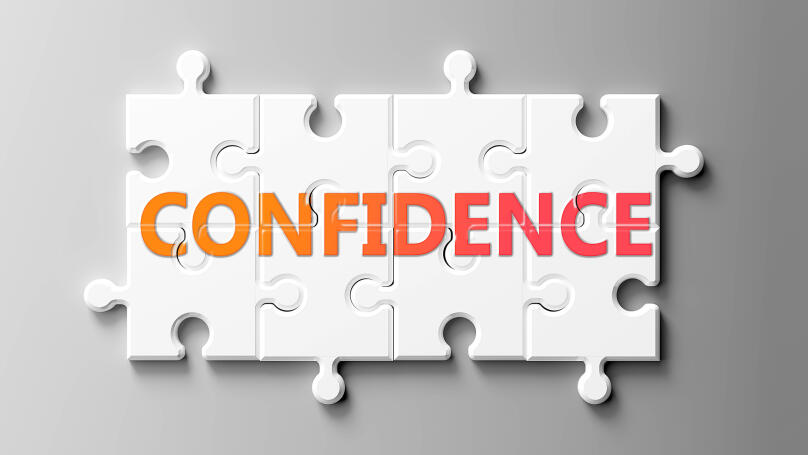How to feel confident in a new workplace
Have you ever noticed that confident people are the best at handling anything?

Like they know how to do everything in the world or act as if they have years of practice under their belt, even if it is their first time trying their hand at something. But here is the paradox: they are confident not because they are so but simply because it is how it is supposed to be. They know: where there is confidence, there is efficiency. That is, it works both ways. Professional confidence gives you a sober assessment of risks and opportunities, helps you stay focused and prevents stress, which, in turn, is the main culprit of lost productivity.
Most people acquire professional confidence unnoticed by themselves, with experience and time spent in the same workplace. However, when that place changes, many suddenly forget the path travelled and the skills gathered, reverting to a rookie position. So how do you regain that professional confidence and quickly feel as comfortable in the new workplace as you did in the old one?
Why do we feel insecure in a new position?

As already mentioned, having professional confidence allows a professional to perform their work more competently and efficiently, focusing on work tasks. When insecure, the specialist shifts the focus from the work to themselves, increasing the probability of error and bringing even more discomfort. However, this state is quite natural in a new workplace - it is part of the adaptation process.
In total, we can identify five stages of adaptation:
- Primary Stress. Paradoxically, adapting to a new workplace begins long before the first working day; it happens when planning the interview. A person studies a new company, "tries on" a new role, analyses, and forecasts. Simultaneously, they react to changes, and the emotional load increases, which can already shake the former confidence because emotions suppress the rational component. This stage is called "pre-contract" in Gestalt therapy.
- Orientation. This stage begins at the job interview. The person learns about future tasks, salary, working conditions, schedule, etc. They try to gather as much information about the new job as possible to prepare for their acceptance.
- Internal Rework and Change Initiation. The employee comes into the office for the first time and tries to put into practice the information they have gathered in the previous stage. It is when the employee begins to "adjust" to the employer's and colleagues' expectations, cognitive functions get switched to the maximum, habitual patterns get rearranged, and new work techniques and tools are learned. It is always the longest stage of adaptation, where self-confidence most often drops to zero.
- Change Optimisation. The person has, more or less, their feet under the table and has figured out the work processes. At this stage, they try to improve or make them more convenient for themselves, adjust and optimise them. Confidence slowly returns to the employee as they start to follow and manage the rules independently.
- Productive Interaction. The employee feels like a part of the company, begins to identify with it, and finally completes the onboarding process. Self-confidence reaches the same level as in the previous job, and productive cooperation begins.
These stages may vary from person to person in terms of timing, intensity, or nature of manifestation. Similarly, insecurity manifests differently in everyone: some become more distracted, some become more aggressive, and some cry constantly or long for their previous job.
How long does this insecurity last on average? According to statistics, 91% of employees need two to three months to get used to a new workplace and stop feeling stressed. For some, it takes only a couple of weeks. The first ninety days, which are called the orientation and reassessment period, are the most difficult. Adjusting the role and fully mastering new tasks takes up to six months (maybe longer, depending on the job's technical complexity). However, feeling confident reduces all these periods by at least half, allowing you to "get acclimatised" to the company much faster.
Nine ways to feel more confident at work

In order not to wait until the onboarding period is over and to gain confidence, even if you are a newbie and this is your first job ever, we advise you to do the following:
1. Identify and name your fears
Isn't it easier to be afraid when aware of your fears? Most often during the period of uncertainty (i.e., from the third to the fourth stage of adaptation), the following trigger fears of this very professional uncertainty arise:
- Fear of error and negative evaluation.
- Fear of rejection or criticism from an opponent (colleague, client, supervisor).
- Fear of dismissal and disappointing others.
- Fear of loss of reputation, authority, and image.
- Fear of loneliness and social isolation.
Try to find out what you fear and assess what you are afraid of for rationality and credibility. In psychotherapy, cognitive distortions are thoughts, stereotypes and beliefs disconnected from reality. Simply put, they are misconceptions about yourself, the world, or a situation. For example, if you are afraid that you will not be qualified enough for this job, then remember that you successfully passed the interview, which probably many candidates besides you went through. If you fear making a mistake, remember the mistakes you have made before (you have!) when you were studying or working at your last job and what happened afterwards. Was it a disaster? Listing your past achievements and successful cases can also help eliminate fears. In short, appeal to your real and personal experience, not preconceptions or other people's opinions.
2. Develop relationships with your colleagues
Strong relationships with your team provide a great morale booster. This way, you will always know you have someone to turn to for help, ask for advice, or offer to have lunch together and unwind a little. Also, positive relationships with your team contribute to a favourable climate in the office, helping you feel more comfortable, primarily if you all work in the same office and constantly interact.
You do not have to develop relationships with everyone at once. Choose one or two people closest to you by occupation, temperament, or type, and garner their loyalty and sympathy. Of course, you should not abuse them, for example, by asking for help all the time or trying to transfer working relationships into friendships deliberately. Your goal is to ensure that you are comfortable and professionally supported. Please find yourself a mentor or coach. You can also ask your supervisor directly for this.
3. Prepare a little more than before
Preparation always boosts the feeling of confidence. At first, try to prepare for everything, especially for essential tasks, such as negotiating or closing a deal that directly affects your work KPIs or relationships with colleagues. Do not spare your time, and do not be lazy. For example, get up early to study your documents again and rehearse your speech. The obtained confidence will definitely be worth the extra energy and time.
4. Set realistic expectations and goals
Our insecurity progresses when we find we are not keeping up with our ideals. It is wrong to demand a perfect performance on par with experienced colleagues when you've just arrived in a new position and are doing an assignment for the first time. Evaluate the complexity and novelty of tasks appropriately and your skills. Show some leniency because, after all, you are new here.
5. Define your purpose and your professional value
You must understand yourself; your goals and priorities give you inner stability. That way, no matter what is happening around you, you always know what you are striving for and working for here. Simply put, having a purpose gives you a pivot. Try using the SMART methodology to set goals, identify your competitive advantage (what makes you different from all other employees?) and audit your strengths and weaknesses. You must improve your strengths and compensate for your weaknesses to gain self-confidence. The following paragraph will help you to do just that.
Lectera’s Online Courses by topic
6. Get training
The more advanced and honed your skills are, the easier it will be for you to use them in your work and, therefore, the more confident you will feel. By increasing your skill level or expanding your toolbox, you will boost your efficiency at the same time! Consider what new skills you could use at work and look for suitable webinars, lectures, or educational courses. With Lectera, for example, you can study online without taking time off work and feeling stressed. Learning soft skills is a win-win - they enhance any professional skills, and employers value them highly.
7. Keep an eye on your appearance
Pay attention to how confident people look. They keep spic and span, dressed up to the nines, and maintain their unique style, even if forced to conform to corporate culture or dress code. Now think back to yourself, in what clothes do you feel most comfortable and irresistible? Or what do you look like in your fantasies when you imagine yourself as a super-confident professional? Try to diversify your wardrobe and experiment. But most importantly, always make sure you look neat! A neat haircut, clean shoes, well-groomed nails, well-groomed face, and accessories (regardless of price) always add confidence.
8. Demonstrate what you already know and can do at least once
Although you will probably be required to perform entirely new tasks and demonstrate fresh skills in your new job, you can always find a place to apply what you already know how to use. For example, you may have a mastery of a piece of software that other colleagues have never even heard of before. Show it to your manager or coworkers, offer to start using it as well, and teach them something of your own. You can also propose new work projects, approaches, and tools based on your old knowledge. Remember, it's a two-way street: just as you need the company, it also needs you. If you get chosen with your current experience, it is also valuable.
9. Keep gathering information
No wonder they say who owns the information owns the world. At work, this is the key not only to career growth but also to peace of mind. Ideally, you should have studied the company up and down even at the interview stage. Still, you should not stop there. Learn more about your manager, company history, office and building structure, neighbouring departments and business processes (even those that do not directly concern you). Keep up to speed with events not only within the company but also outside it. To achieve this, follow market trends and news in your niche and play ahead of the curve.
Professional confidence always comes with experience, time and understanding that we are all human. As the proverb goes, "To err is human." It's okay to take time to get used to new conditions and face problems or stress. It is vital to see the goal, your opportunities and advantages, and also not forget that the adaptation process will end sooner or later. The new workplace will become old, comfortable and familiar. Be patient and indulgent with yourself!
Share this with your friends via:
Latest News

In the UK, £23 million has been allocated for the expansion of the EdTech Testbed program — pilots of educational technologies in schools and colleges.

In the US, Tuskegee University announced the launch of Tuskegee University Global Campus (TUGC) — a new online platform for distance learning.

A significant stage in the development of the alternative education system has begun in West Northamptonshire in the UK: the County Council is actively calling on parents, guardians, and trustees to participate in shaping the future of this key area.

Outwoods Primary School in Atherstone, Warwickshire, having experienced deep sadness after the loss of their famous cat, Silla, has found solace in a new pet – a Maine Coon named Aloysius O’Hara.

In modern universities, artificial intelligence, and in particular ChatGPT, is rapidly transforming from a controversial tool into a full-fledged student assistant.












 9 Career Mistakes Young Professionals Make
9 Career Mistakes Young Professionals Make
 £23 million allocated for the expansion of EdTech Testbed in the UK
£23 million allocated for the expansion of EdTech Testbed in the UK
 Tuskegee University launches Global Campus — a new online platform
Tuskegee University launches Global Campus — a new online platform
 Test: How Psychologically Mature Are You? Check Your Inner Foundation.
Test: How Psychologically Mature Are You? Check Your Inner Foundation.
 Test. Check Your Social Media Dependency Level!
Test. Check Your Social Media Dependency Level!
 Test: What Business is Right For You?
Test: What Business is Right For You?
